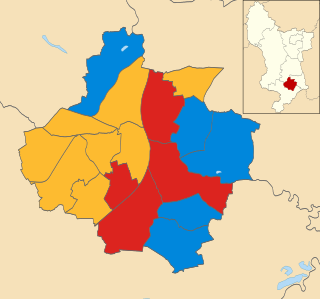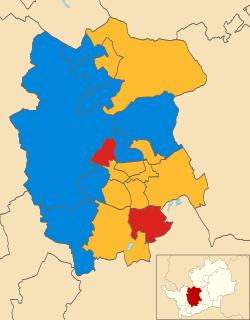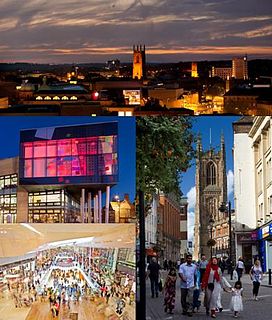The 1999 Lichfield District Council election took place on 6 May 1999 to elect members of Lichfield District Council in Staffordshire, England. The whole council was up for election and the Conservative party gained overall control of the council from the Labour party.
The 1998 Derby City Council election took place on 7 May 1998 to elect members of Derby City Council in England. One third of the council was up for election and the Labour party kept overall control of the council.
The 2000 Derby City Council election took place on 4 May 2000 to elect members of Derby City Council in England. One third of the council was up for election and the Labour party kept overall control of the council.

The 2002 Derby City Council election took place on 2 May 2002 to elect members of Derby City Council in England. The whole council was up for election after boundary changes since the last election in 2000 had increased the number of seats by 7. The Labour party stayed in overall control of the council.

The 2003 Derby City Council election took place on 1 May 2003 to elect members of Derby City Council in England. One third of the council was up for election and the Labour party lost overall control of the council to no overall control.

The 2006 Derby City Council election took place on 4 May 2006 to elect members of Derby City Council in England. One third of the council was up for election and the Labour party lost their majority on the council to no overall control.

The 2007 Derby City Council election took place on 3 May 2007 to elect members of Derby City Council in England. One third of the council was up for election and the council stayed under no overall control.

The 2008 Derby City Council election took place on 1 May 2008 to elect members of Derby City Council in England. One third of the council was up for election and the council stayed under no overall control. Overall turnout was 34.6%.
The 1999 Hull City Council election took place on 6 May 1999 to elect members of Hull City Council in England. One third of the council was up for election and the Labour party kept overall control of the council. Overall turnout in the election was 19.4%.

The 2007 Hull City Council election took place on 3 May 2007 to elect members of Hull City Council in England. One third of the council was up for election and the Liberal Democrats gained overall control of the council from no overall control. Overall turnout was 27%.

The 2006 St Albans City and District Council election took place on 4 May 2006 to elect members of St Albans District Council in Hertfordshire, England. One third of the council was up for election and the Liberal Democrats gained overall control of the council from no overall control.
The 1999 Burnley Borough Council election took place on 6 May 1999 to elect members of Burnley Borough Council in Lancashire, England. One third of the council was up for election and the Labour party stayed in overall control of the council.
The 1999 Wyre Forest District Council election took place on 6 May 1999 to elect members of Wyre Forest District Council in Worcestershire, England. One third of the council was up for election and the Labour party lost overall control of the council to no overall control.
The 1999 Winchester Council election took place on 6 May 1999 to elect members of Winchester District Council in Hampshire, England. One third of the council was up for election and the Liberal Democrats stayed in overall control of the council.

The 1999 Leeds City Council election took place on 6 May 1999 to elect members of City of Leeds Metropolitan Borough Council in West Yorkshire, England. One third of the council was up for election, as well as a vacancy each in Horsforth, Moortown and Wetherby. Prior to the election, the Liberal Democrats had gained a seat in Bramley from Labour, and Hunslet councillor, Mark Davies, had defected from Labour to Independent Socialist.
The 1999 Oldham Council election took place on 6 May 1999 to elect members of Oldham Metropolitan Borough Council in Greater Manchester, England. One third of the council was up for election and the Labour party stayed in overall control of the council.
The 1999 Southampton Council election took place on 6 May 1999 to elect members of Southampton Unitary Council in Hampshire, England. One third of the council was up for election and the Labour party stayed in overall control of the council.
The 1999 Milton Keynes Council election took place on 6 May 1999 to elect members of Milton Keynes Unitary Council in Buckinghamshire, England. One third of the council was up for election and the Labour party stayed in overall control of the council.

The 2010 Amber Valley Borough Council election took place on 6 May 2010 to elect members of Amber Valley Borough Council in Derbyshire, England. One third of the council was up for election and the Conservative party stayed in overall control of the council.












